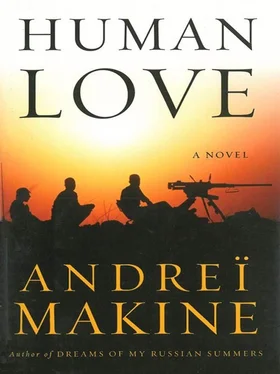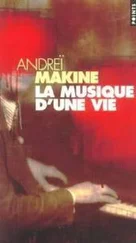Excellent fighters, these Cubans! The cordon was watertight; the advance of small commando units, covering one another in turn, was rapid and controlled, like an attacking maneuver on a sports field. When their voices could be heard near our prison, Elias called out to them in Spanish, The military instructor, who had woken up, yelled in Russian. The door opened, and by the ashen light of dawn reality began to permeate the nights phantasmagoria. Two Soviet military advisers who had taken part in the assault came and joined us. Fresh water had the impact of an antidote. A doctor gave us injections redolent of the sterilized cleanliness of a hospital. The world of the living was reasserting itself, banishing the void. And among the trees the prisoners were burying the dead. The instructor spoke a comical Russo-Hispano-Portuguese lingo, to the amusement of the soldiers surrounding him. The spicy aroma of canned meat hung on the air and gave me a pleasant knot in my stomach.
I saw Elias a little apart, where, under the supervision of a soldier, two prisoners, detailed as gravediggers, were busy I walked over, glanced into the grave they were filling. At the bottom of the same pit, a woman’s body in her torn clothes, one breast bared, riddled with bullets, and, pressed up against her, lying on his side in a very lifelike pose of abandon, the youth, still wearing his gas mask. I was on the point of asking them to let me undo the rubber from his face, but the rhythmic fall of shovelfuls of reddish earth had already covered the two bodies almost completely. “It doesn’t matter,” murmured Elias, and drew me toward the camp. I thought his “doesn’t matter” was a rather hasty way of sparing me a pointless gesture, one pain too many. But as he walked along he added in more resolute tones: “If there’s nothing beyond all this, then men are no more than ants, chewing, copulating, and killing one another. In that case nothing matters. And they can bury this kid without removing his carnival toy. Yes. If there’s nothing beyond all this… To be certain a woman’s not just a lump of meat that’ll rot beneath the red earth, you need to love well.”
It was perhaps the only time I ever heard the word love on his lips, love in the sense of falling in love, being head over heels in love. Some years later we met in Kinshasa, and that evening he told me again about the train that had carried them, him and his beloved, through endless white forests. He was already aware of all that separated them and all that threatened his own life, divided between wars, revolutions, and games of espionage. But his voice was serene, almost joyful. He said he would have given everything just for the scent of the cold that clung to the dress of the woman he loved. They were getting back onto the train after a halt in the taiga at night, and for a few moments, amid the warmth of the compartment, he could detect this fragrance of snow on the gray wool of her dress. “I would have gone through G-2 again for it,” he murmured, leaning closer and smiling at me. This was the Zairean detention camp where he had been horribly tortured. Men were generally broken there within a few weeks. It was then that I thought I understood the “beyond all this” he had spoken of beside the pit where they were burying the diamond carrier and the masked child. Understood, too, why it was love that made the world matter, without which we should be no more than insects hurrying to take our pleasures, masticate, and die.
… It is the moment of leavetaking on the terrace next door. The lovers arrange to meet tomorrow, to go dancing at the Nirvana, the best club in town, according to the artist. The woman, the organizer, has it all planned: “They’ll be reaching the end of their palaver about eight thirty. Once I’ve taken them to the restaurant, I’ll slip away…” “They” is us, a dozen writers, the cultural shop window for the international conference on sustainable development in Africa. And “their palaver” is our symposium tomorrow: “African Life Stories in Literature.” The lovers kiss, and the young man goes off, with a big portfolio under his arm. He had called to show her his drawings… Appearances have been maintained.
Only yesterday all this would have seemed totally insignificant to me. A white woman on the wrong side of forty takes advantage of a professional trip to Africa to embark on a not very demanding affair with a young African, sexually better endowed than her husband, Christian, with his honest, melancholy eyes. Being little given to moralizing, I might even have found it rather endearing, the gains won by feminism now taken for granted, modernity without complexes. I might have sustained the irony as far as to salute this “fair exchange,” the lady receiving her youth hormone therapy, the young stud support for some phony association he ran. Yes, I should have had thoughts along those lines, midway between amusement and indifference, and quickly forgotten them.
But many things have happened since yesterday I have relived that night in Lunda Norte, I have recalled the sight of that youth in his gas mask, first of all the young braggart threatening us, then the child huddled up in a grave of red earth, pressed against a woman with a mutilated breast. I have remembered Elias s words the day he told me about the torture at Camp G-2: “They hung us from our wrists and twisted our bodies. At a certain moment the pain was such that you really felt as if wings were growing between your shoulder blades and they were ripping them off. Then you lost consciousness.”
Yes, I had rediscovered Elias Almeida’s face and voice in my memory. For long years I had been in flight from this rediscovery, I dreaded it. Now his gaze rests on our life here – myself, the white woman and the black man who have just taken their pleasure and parted. The woman has showered, gone to bed, scribbled several lines in her notebook (no doubt she writes down the details of all these liaisons she has on her trips to Africa). The day before I should have laughed at it. Now, with Elias s eyes upon us, this I know: while she is dancing with her gigolo tomorrow night, they will be digging a grave to bury a woman with torn breasts and a nameless child. And at the same moment, in a cellar from which no cry escapes, a man hanging by his wrists from a hook will not even feel the burning of the cigarette end stubbed out on his neck by a soldier. Yes, at the same moment. For on this soil of Africa all this happens unremittingly. “African Life Stories in Literature…”
To respond to Elias’s voice, one would have to be able to talk about this terrible synchronicity in human lives. To speak of that night in Lunda Norte, the nasty little granules of diamonds extracted from a woman’s mouth by a soldier just after she had been raped and shot; to speak of the asterisk on the soldiers cheek and the rather similar scar on the clean-shaven face of one of the fat-cat Africans outside the elevator this evening, and of the youth whose left hand, with its slender fingers, was the last thing to disappear beneath the shovelfuls of red earth; to speak of the white administrator who, in recognition of services rendered, will arrange an exhibition for her African lover, who draws smiling children; to speak of the six-year-old girl, little Delphinette, who does not yet know this aspect of her mother: a tousled head thrust between the thighs of a sweating male; to speak of a man whose shoulder blades are being twisted by the strappado till he loses consciousness, feeling he has wings… And to speak of that young Angolan in the railway compartment, never taking his eyes off a woman whose dress retains within its folds the fragrance of a forest deep in snow Speak of this man who loved.
A week after our release, I saw Elias again at the Luanda airport. The colleague traveling with him addressed him by a name unknown to me – doubtless one of those names Elias had gone under during his life, or, rather, during his lives. When we were left alone, he clapped his hand to his brow and exclaimed: “There, you see. I’d completely forgotten… Here. Its yours. Keep it. There’s ink in it now!”
Читать дальше









